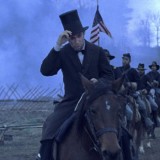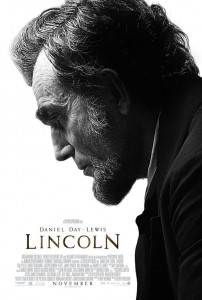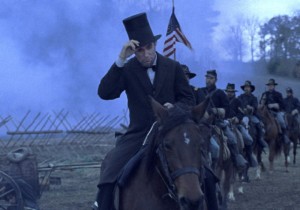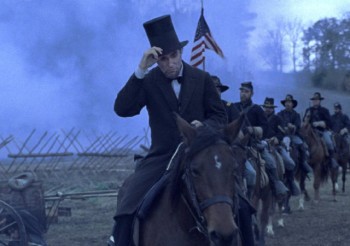
Movie Review: Lincoln

Adapting Doris’ Kearns Goodwin’s Pulitzer-winning Team of Rivals; an exhaustive account of Lincoln’s most crucial presidential days , fellow Pulitzer recipient Tony Kushner (Angels in America) writes with a dynamic mixture of historical accuracy, anecdotal color, and a dash of hero worship. Goodwin’s book was celebrated for its inviting Lincoln surrounded by admirers even amongst his sometimes ideologically opposed and diverse cabinet urging the president against his determined moral stance on passing the 16th Amendment to the Constitution to abolish slave owning in the South. That monumental bureaucratic task is the centerpiece drama of the film; depending on your interest in films that explore the political process, Lincoln will either be a masterful presentation of the intricate backroom dealings and cunning last minute intrigue that finally brought the vote to abolish slavery to its improbable ratification or a rote History Channel classroom lesson with seasoned acting.
Spielberg’s penchant for over-explaining in lumpy scenes with free African Americans (first a duo of soldiers Biblically reciting the Gettysburg address and later Lincoln in fleeting council with his housemaid) provide the only hollow notes in a film surprisingly light on its feet. Kushner structures the inevitable outcome like an intellectual thriller propelled by cantankerous scenes between Lincoln and his confidantes or the scene-stealing trio of proto-lobbyists played with gusto by James Spader (a rotund, mustachioed hoot), John Hawkes, and Tim Blake Nelson. In taking the All the President’s Men approach to familiar history, Lincoln mostly succeeds in sustaining a drama whose outcome has been known for these 200+ years but keeps us intrigued with the manner in which the “yea” votes were obtained.
So we know the tangled tragedies which await both Lincoln and his freed brethren (though the film has the good taste to assassinate the great man off-screen) but the true drama and joy in Spielberg’s long-gestating dream project is to feel that we are sequestered with a mythic American figure brought down to human terms, speaking with a quiet Midwestern lilt, illuminated by oil lamps and facing the dread of a nation with both pragmatism and no small amount of beard-stroking anecdotal humor.

Daniel Day-Lewis in “Lincoln.”
Spielberg meets the challenge of not over-playing set by his actors by keeping the John Williams bombast at bay, letting dialogue scenes play out in extended takes that are perhaps too formal if you seek a pungent naturalism but which pay reverence to Lincoln’s fabled way with a convincing word and the lively debates he encouraged between his closest foils including Secretary of State William Seward (David Strathairn) and the equally complex Mary Todd Lincoln (Sally Field). Joseph Gordon-Levitt is mostly a non-starter in the historically necessary but dramatically slight role of Robert Lincoln, the son who lived and went to war while his mother could only grieve for the one who didn’t. The domestic drama is an interesting insight into Abraham Lincoln the rounded man, but offers little more than gossipy color until the ethical fight is joined again in rousing courtroom-style scenes played out in the rambunctious Senate. Here, Tommy Lee Jones joins the fray with a somber, muted take on the abolitionist senator Thaddeus Stevens, a moral compass pointing North to freedom and legitimacy for Southern black people but finding himself aged and haggard as his life’s work is being brought to the finish line by a president with a lawyer’s tenacity and a philosopher’s heart. Jones resists the full Pacino he sometimes leans on and gives a tender performance that offers a counterpoint to Day-Lewis’ fiery bluster.
In recent films like Gangs of New York, There Will Be Blood, and now Lincoln, Daniel Day-Lewis has perched himself as a kind of surveyor of early American history in its most rugged incarnations. He plays men with purpose and heavy thoughts with Lincoln being his most high profile characterization yet in a towering performance that will be talked about for years to come and is more than enough to recommend a thoroughly enjoyable, sharply written if sometimes preachy barnstormer.

Gregory Fichter

Latest posts by Gregory Fichter (see all)
- Bela Lugosi’s Not Really Dead: A Vampire Movie Primer - November 18, 2011
- Ten Great Summer Grindhouse Movies - August 16, 2011
- The Ten Best Johnny Depp Movies - May 19, 2011



